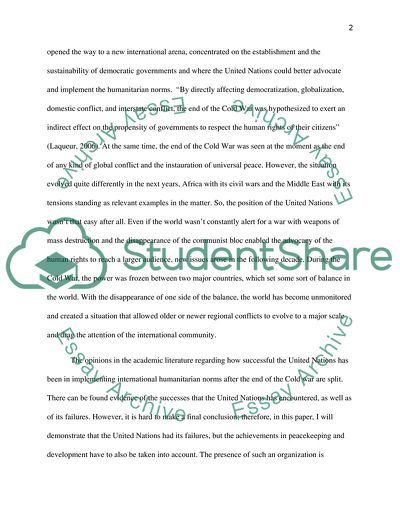Cite this document
(Has the UN Been a Success or Failure in Implementing Humanitarian Research Paper, n.d.)
Has the UN Been a Success or Failure in Implementing Humanitarian Research Paper. Retrieved from https://studentshare.org/politics/1737985-has-the-un-been-a-success-or-failure-in-implementing-humanitarian-norms-in-world-politics-since-the-end-of-the-cold-war-use-appropriate-examples-to-illustrate-your-answer
Has the UN Been a Success or Failure in Implementing Humanitarian Research Paper. Retrieved from https://studentshare.org/politics/1737985-has-the-un-been-a-success-or-failure-in-implementing-humanitarian-norms-in-world-politics-since-the-end-of-the-cold-war-use-appropriate-examples-to-illustrate-your-answer
(Has the UN Been a Success or Failure in Implementing Humanitarian Research Paper)
Has the UN Been a Success or Failure in Implementing Humanitarian Research Paper. https://studentshare.org/politics/1737985-has-the-un-been-a-success-or-failure-in-implementing-humanitarian-norms-in-world-politics-since-the-end-of-the-cold-war-use-appropriate-examples-to-illustrate-your-answer.
Has the UN Been a Success or Failure in Implementing Humanitarian Research Paper. https://studentshare.org/politics/1737985-has-the-un-been-a-success-or-failure-in-implementing-humanitarian-norms-in-world-politics-since-the-end-of-the-cold-war-use-appropriate-examples-to-illustrate-your-answer.
“Has the UN Been a Success or Failure in Implementing Humanitarian Research Paper”, n.d. https://studentshare.org/politics/1737985-has-the-un-been-a-success-or-failure-in-implementing-humanitarian-norms-in-world-politics-since-the-end-of-the-cold-war-use-appropriate-examples-to-illustrate-your-answer.


